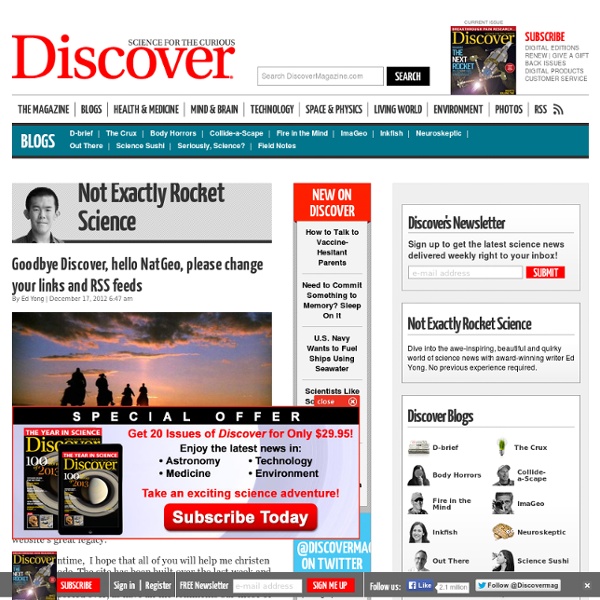NeuroLogica Blog
Jan 13 2017 Cognitive Biases in Health Care Decision Making This was an unexpected pleasant find in an unusual place.
Researchers now able to stop, restart light
By William J. Cromie Gazette Staff "Two years ago we slowed it down to 38 miles an hour; now we've been able to park it then bring it back up to full speed."
Centpeus
Una afirmació que sovint fem els científics i que acostuma a fer ràbia és que hi ha coses que no son opinables. Potser perquè vivim en una època on s’imposa el relativisme en tot i sembla que tots els punts de vista mereixen el mateix respecte i consideració. Personalment em sembla que potser ens passem de frenada i hi ha idees i conceptes que no em mereixen gaire respecte, però això és un altre tema. El cas és que en ciència, les opinions estan bé però només si estan recolzades per dades. Podem opinar sobre com interpretem la realitat, però no sobre com és aquesta. La salut i l’alimentació són aspectes on aquests temes prenen molta rellevància i on s’acostuma a fer poc cas de les dades i molt de les opinions.
The Loom
Your hands are, roughly speaking, 360 million years old. Before then, they were fins, which your fishy ancestors used to swim through oceans and rivers. Once those fins sprouted digits, they could propel your salamander-like ancestors across dry land. Fast forward 300 million years, and your hands had become fine-tuned for manipulations: your lemur-like ancestors used them to grab leaves and open up fruits. Within the past few million years, your hominin ancestors had fairly human hands, which they used to fashion tools for digging up tubers, butchering carcasses, and laying the groundwork for our global dominance today. We know a fair amount about the transition from fins to hands thanks to the moderately mad obsession of paleontologists, who venture to inhospitable places around the Arctic where the best fossils from that period of our evolution are buried.
Bad Astronomy
Well now, this is an interesting discovery: astronomers have found what looks like a "super-Earth" – a planet more massive than Earth but still smaller than a gas giant – orbiting a nearby star at the right distance to have liquid water on it! Given that, it might – might – be Earthlike. This is pretty cool news. We’ve found planets like this before, but not very many!
Pharyngula
Probably not. But the New York Times reports: A review of studies has found that the health benefits of infant male circumcision vastly outweigh the risks involved in the procedure. Actually, it doesn’t. Not at all. The paper is all about the frequency of circumcision in the US; this is the only real data in the paper, and notice that a good chunk of it is speculation.
paleoanthropology, genetics and evolution
I have a review of Marlene Zuk's new book, Paleofantasy , in this week's Nature : "Evolutionary biology: Twisting the tale of human evolution" [1] . I can't replicate my review here, but for people who have access to Nature I thought I'd bring attention to it. And if you don't have access, I wanted to share a couple of my reactions. It was a fun book for me to read. Zuk brings a light-hearted skepticism to a broad array of topics in human evolution. She took as her focus a collection of "paleo-advice" ideas: barefoot running, paleo diet, back-to-nature parenting advice.
Science
Stories tagged with “Science” This 32-Year-Old Florida Woman Is Dead Because Her State Refused To Expand Medicaid One English Town’s Innovative Response To Sea Level Rise Women From Koch-Funded Conservative Groups Lambaste Equal Pay Measure Culture
Timeline: The evolution of life - life - 14 July 2009
Read full article Continue reading page |1|2|3|4 There are all sorts of ways to reconstruct the history of life on Earth. Pinning down when specific events occurred is often tricky, though. For this, biologists depend mainly on dating the rocks in which fossils are found, and by looking at the "molecular clocks" in the DNA of living organisms.



